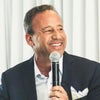What Robin Hood CEO Wes Moore Learned From Loving His Career on Wall Street to Pursue His Passion Plus, Moore explains how all of us have skills that can be used to help during a crisis.
Opinions expressed by Entrepreneur contributors are their own.
On this episode of The Playbook, Robin Hood Foundation CEO Wes Moore talks about:
- Why everybody knows the things that make their heart beat faster, but few of us choose to seek them out [8:48].
- What he learned from leaving his career on Wall Street to pursue a career he was truly passionate about [10:14].
- How Robin Hood is generating billions of dollars to fight against poverty and how he's leading the organization through a time of dire crisis [13:31].
- Why you need to find your "unmatched skillset" and utilize that to make the world better during the current crisis [21:16].
Related: 10 Things You Shouldn't Invest In











